For the month of January, the contenders of Deadshirt are looking at the high highs (and low lows) of Sylvester Stallone’s Rocky franchise. For each installment, Deadshirt film editor Max Robinson sits ringside with another Deadshirt staffer to discuss the film. For this fifth installment, Max and David Lebovitz attempt to determine the measure of the man in Rocky V.
Rocky V (1990)
Directed by John Avildsen
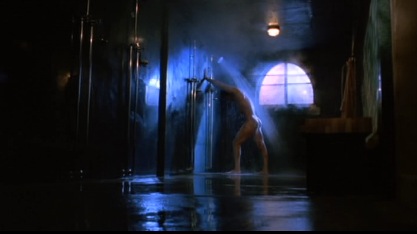
Max: Rocky V is widely, perhaps wisely, considered the low point of the Rocky franchise and for good reason. Where do you go after Rocky Balboa basically ended the Cold War? On paper, the film’s “back to basics” approach sounds good: Rocky and his family, finding themselves swindled out of their fortune, find themselves back on the mean streets of Philadelphia with Rocky training a talented protege. Stallone even handed over directorial reins to John Avildsen, who directed the original Rocky. The actual end product is a depressing mess obsessed with former glories. David, your thoughts?
David: It’s certainly good in theory, which is why the final product upsets me so much. I’m fine with bad movies or even dumb movies, but movies with mishandled potential haunt me the angry specter of Burgess Meredith. In Springsteen terminology, this could have the Nebraska of Rocky films, a stripped down, gritty return to its roots after increasingly bombastic sequels. Instead we got High Hopes, a collection of half baked ideas that never go anywhere satisfying. In terms of execution, style, and botched theme, this is most certainly the Revenge Of The Sith of Rocky.
Max: Rocky V opens, appropriately, on Stallone’s bare ass. It’s minutes after Rocky’s defeat of Ivan Drago in Rocky IV, and we learn that the Rocky sequels are literally killing Balboa. Rocky’s head-trauma induced hallucinations and debilitation are a big part of the film but never pay off beyond justifying some flashbacks where Mickey appears like the pissed off ghost of Yoda. Back in America, Rocky enjoys some family time with Adrian, unrepentant scumbag Paulie, and Rocky’s son Robert, who has aged five years in the span of a month. Rocky is both delighted and alarmed by his son’s challenging art.
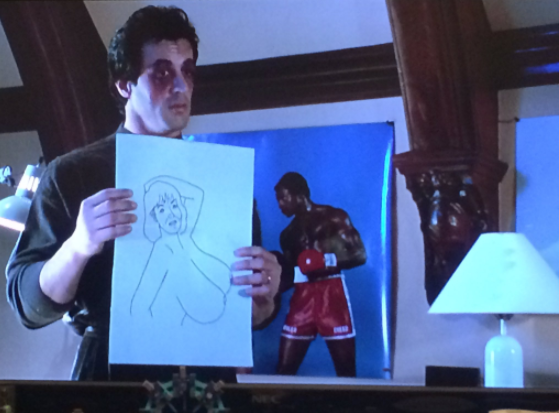
David: The whole scene with his son here comes across less like a Rocky film and more like an SNL parody of a Rocky film. I’d also like to draw attention to Rocky’s press conference, where Not Don King shows up with a microphone so powerful that it apparently didn’t need an amplification system against the laws of god and man, and a marching band plays the Rocky theme from the first film, which somehow became an actual in-universe song. Naturally, after telling his son how nice it is to be rich, he soon finds out that though a Wacky Miscommunication, Rocky’s accountant got power of attorney and blew all of his money. Conflict!
Max: I’ll give Rocky V credit for understanding that Rocky being rich sort of fucks up Rocky’s entire deal as man of the people underdog, but they manage to do this in the most ham-handed way possible, complete with Robert getting kicked off his dad’s motorcycle. What’s sort of interesting about Rocky V is that what it attempts here—Rocky as an everyday guy who’s happy living in his old digs in Philly—is done better in later on in Rocky Balboa and Creed. It’s not a good movie, but it’s weirdly important to Rocky Canon. I also sort of dig the movie’s bait and switch with Tommy “The Machine” Gunn, who starts out as Rocky’s protege but totally fucks him over once he makes a name for himself. The flipside of this is that Tommy (and obvious Don King stand-in/problematic racial stereotype George Washington Duke) are pretty flimsy characters.
David: Tommy has a solid start and somehow becomes a worse character as he develops. Rocky retiring from boxing full time to take on a protege is one of the many solid concepts this film has that just fizzles out. We get to know a lot about Tommy at the beginning—a guy with a distinct personality from a distinct place with distinct motivations—and by the end of the movie he’s just another bad guy who gets bloodied. Somehow Robert becomes friends with the kid who bullies and robs him, but Tommy just vanishes from the series in a pile of garbage with no chance at reconciliation. It felt hollow. Credit where credit is due, though: he did manage to punch Rocky in the head so hard that he fixed Rocky’s brain damage. Sylvester Stallone’s head is basically the jukebox from Happy Days.
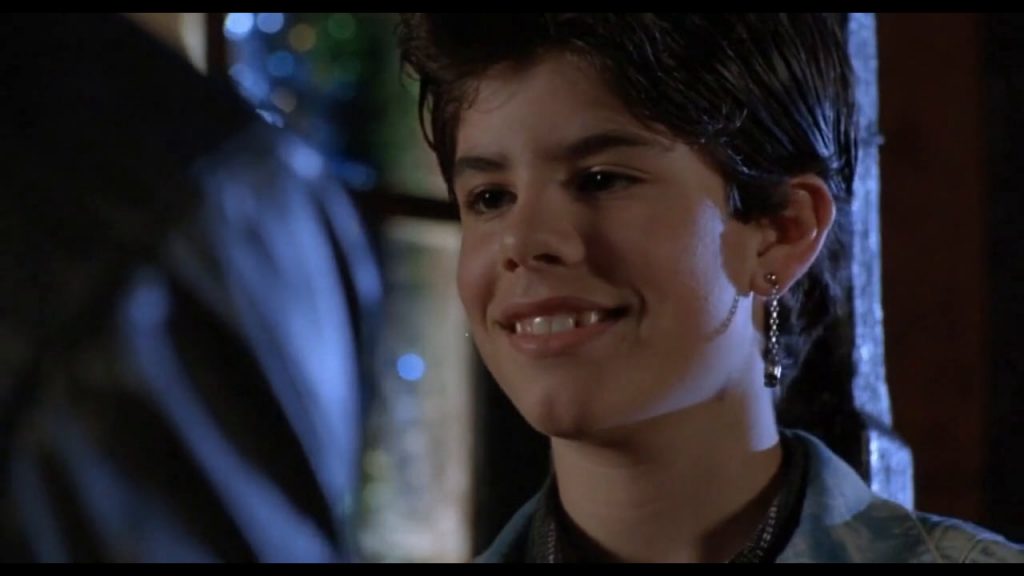
Max: Oh man, the Robert B-plot of this movie is so unbelievably bad and pointless. This movie assumes you really care about Rocky’s boring kid! Sage Stallone is…fine? here but Rocky V wastes so much time on Robert Balboa becoming a sullen earring teen because Rocky kicked him out of his room so a giant mullet guy could sleep in it. All of the Rocky sequels really waste Talia Shire but it’s pretty inexcusable that the movie more or less forgets about her after Act I. Paulie—PAULIE—gets more to do in this movie.
David: “Dad focuses more on his project than his son” is a bit of a tired trope—the “Cats In The Cradle” effect—but it’s used so much because it’s not that hard to screw up. Here, it’s just weird. Robert goes from speaking eloquently with a mid-Atlantic accent to a Philadelphia street urchin with a jarringly long single earring, and he has a single bruise on his face that seemingly lasts for weeks while Tommy heals fully between fights. Good job, makeup. Adrian also seemingly has a sixth sense for when Not Don King is gonna show up, because all she does is fight him off. She even tracks him down in mid-conversation on the street. No beeper is THAT good.
Max: George Washington Duke is one of this movie’s many missed opportunities. Richard Gant does the best he can with the material, but Rocky dealing with an unscrupulous Don King-type who he has to stop from taking advantage of Tommy Gunn COULD have been enough of a plot. But it’s also just a huge bummer that we’ve gone from well developed African-American characters like Apollo Creed to the totally one-note Duke. Like, at least you sort of understood where Clubber Lang was coming from, this guy’s just a moustache twirling villain who shows up to do schtick.
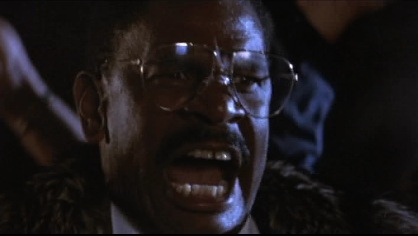
David: It’s understandable why Tommy would go for Duke, since it’s clear Tommy is an up-and-comer and kind of a dummy because of it. But he was such a jerk to Tommy that it makes it even more bizarre to me that Tommy didn’t turn on him in some way at the end. After putting him in that press conference with the World’s Most Obnoxious Journalists, he was clearly angry, and that anger went…nowhere. That’s Rocky V for you, two storylines with a ton of potential implode on each other. No Stallone slight of hand is gonna bring those two stories back.
Max: I’d also like to point out that Bill Conti came back to score this one but his contributions are drowned out by some extremely out of place rap provided by MC Hammer and 7A3, including a hip hop version of Noted Twitter Racist Frank Stallone’s doowop song from the first movie. Conti’s score is a big part of the first three Rocky films, and his diminished presence here speaks to this movie’s lack of a real identity.
David: There was a real sense of this film being Rocky: Back 2 tha Hood at times. Rap makes for great montage music—it’s so easy to edit to—but here it just stuck out, especially in a film where Rocky was called “the great white hope.” The film ending with an Elton John song goes beyond “out of place” and square into “baffling.” Especially since That Wasn’t Going To Be The Original Ending.
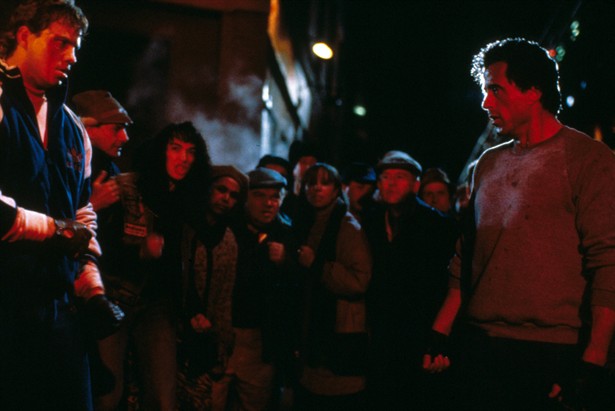
Max: Incredibly, the original ending of Rocky V would have found him dying in the film’s climactic street fight with Tommy Gunn, and Adrian telling a crowd that Rocky’s spirit lives on in the people of Philadelphia or some bullshit. This goes a long way toward explaining Rocky’s brain damage-induced hallucinations and the overall downer vibe of the film, but Stallone was probably correct in not offering moviegoers a film where an iconic American movie hero is beaten to death in the street in front of his family. The trade-off here is that Rocky doesn’t have anything resembling an arc. Rocky never really tries to get his fortune back, and his mentorship of Tommy Gunn seems like something he’s just doing because he likes the kid. Nobody learns anything and we end on a frankly pretty ugly moment of Rocky popping Duke in the face out of spite.
David: In the immortal words of George Lucas, “There’s no money in dead Han toys.” Even in a less toyetic film, killing off the heroes for funsies is a Bad Idea, and changing your idea for an ending most of the way through filming messes up your tone. For a film with the continued message of “win it back”—be it his son, his fame, his fortune, or his reputation—his story just kind of ends before he truly wins anything. Most importantly, it didn’t win where it mattered: the box office. It was such a disappointment that it took fifteen years for us to get a sequel. Rocky V did worse than just mishandle potential, it nearly tanked a franchise.
NEXT: IT AIN’T OVER TILL IT’S OVER

